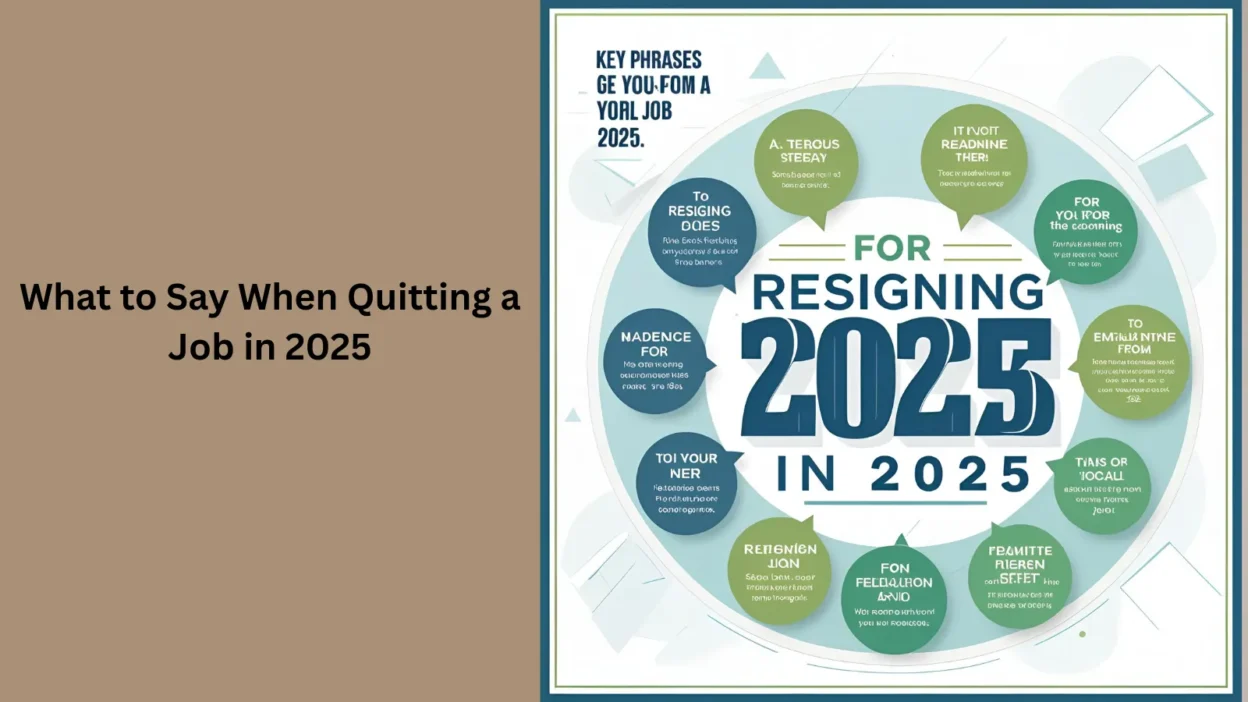Leaving a job can feel like stepping into the unknown. Your stomach churns, palms sweat, and you wonder, “What do I even say?” Deciding what to say when quitting a job is crucial to leaving on good terms.
A graceful exit keeps doors open for future opportunities and shows respect for your team. Whether you’re chasing a dream job or escaping a tough situation, the words you choose matter.
This guide breaks down exactly what to say (and what to avoid) to make your resignation smooth and professional. With practical tips and real-life examples, you’ll feel confident walking into that conversation, ready to leave with your head held high.
Why Your Words Matter When Quitting
Your resignation is more than a goodbye—it’s your final impression. Speaking thoughtfully shows professionalism and preserves relationships. A poorly handled exit can burn bridges, affecting references or networking later.
Scenario: Sarah quit her retail job abruptly, saying, “I’m done here.” Her boss felt disrespected, and she lost a valuable reference.
What to Say: “I’ve appreciated my time here, but I’ve decided to pursue a new opportunity. I’d like to give two weeks’ notice.”
What Not to Say: “This place is awful, I’m out!” Keep it positive to maintain goodwill.
Be clear, concise, and grateful. Express appreciation for the experience, even if it wasn’t perfect, to leave a lasting positive mark.
How to Prepare for the Conversation
Preparation is key to a confident resignation. Practice your words to stay calm and clear. Write down your main points, like why you’re leaving and your notice period. Decide how much detail to share—keep it professional, not personal.
Scenario: John wanted to quit his office job for a career change. He rehearsed his speech to avoid rambling during the meeting.
What to Say: “I’ve decided to transition into a new field, and I’ll be resigning effective two weeks from today. Thank you for the support.
What Not to Say: “I’m leaving because I’m bored and hate the long hours.” Focus on your future, not complaints.
Schedule a private meeting with your boss to show respect. Avoid quitting via email or text unless absolutely necessary. Preparation builds confidence and keeps the conversation smooth.
Delivering Your Resignation Professionally
When it’s time to talk, stay calm and professional. Start with gratitude, state your decision clearly, and offer a standard notice period (usually two weeks). Be ready for questions about your reasons, but keep answers brief and positive.
Scenario: Emma resigned from her teaching job to relocate. She kept her tone warm but firm, avoiding emotional oversharing.
What to Say: “I’ve loved working here, but I’m relocating and will be resigning. I’ll ensure a smooth transition during my notice period.”
What Not to Say: “I can’t wait to leave this stressful job!” Negativity can sour relationships.
If your boss reacts poorly, stay composed. Reiterate your gratitude and commitment to a professional exit. Your tone and body language matter as much as your words.
Handling Counteroffers Gracefully
Sometimes, employers offer raises or promotions to keep you. Know your reasons for leaving before the conversation. If you’re set on quitting, politely decline without burning bridges. If you’re open to staying, listen carefully but don’t decide on the spot.
Scenario: Mike quit his tech job for a better opportunity. His boss offered a raise, but Mike stayed firm.
What to Say:“I truly appreciate the offer, but I’ve made my decision to move forward with a new role.”
What Not to Say: “No way, I’m done with this company!” Stay respectful, even if declining.
Weigh counteroffers carefully—money might not fix deeper issues like job satisfaction. Be honest with yourself about why you’re leaving to avoid regret.
Offering Support During Your Notice Period
Show you’re a team player by easing the transition. Offer to train a replacement, document your tasks, or help tie up loose ends. This builds goodwill and strengthens your reputation.
Scenario: Lisa quit her marketing job and spent her last two weeks organizing files and training a colleague.
What to Say: “I’m happy to help during my notice period, whether it’s training someone or documenting my responsibilities.”
What Not to Say: “I’m just counting down the days!” Disengagement reflects poorly.
Be proactive but set boundaries—don’t overcommit to tasks you can’t complete. Your willingness to help leaves a positive final impression.
Writing a Resignation Letter
A resignation letter formalizes your exit and should echo your in-person conversation. Keep it short, positive, and professional. Include your last day, gratitude, and a nod to the transition.
Scenario: Tom wrote a concise letter after quitting his sales job, ensuring no details were misinterpreted.
What to Say: “Dear [Boss], I’m resigning effective [date]. Thank you for the opportunities here. I’ll support a smooth transition.”
What Not to Say: “I’m leaving because this job wasn’t what I expected.” Avoid negativity in writing.
Keep a copy for your records. A well-crafted letter reinforces your professionalism and serves as documentation.
Final Thoughts
Quitting a job is a big step, but knowing what to say when quitting a job makes it manageable. Your words shape how colleagues and employers remember you.
By preparing, staying professional, and showing gratitude, you leave with respect and keep future doors open. Whether it’s a tough job or a beloved role, a graceful exit sets you up for success.
Practice your conversation, write a clear resignation letter, and offer support during your notice period. With these steps, you’ll walk away confidently, ready for your next chapter.




